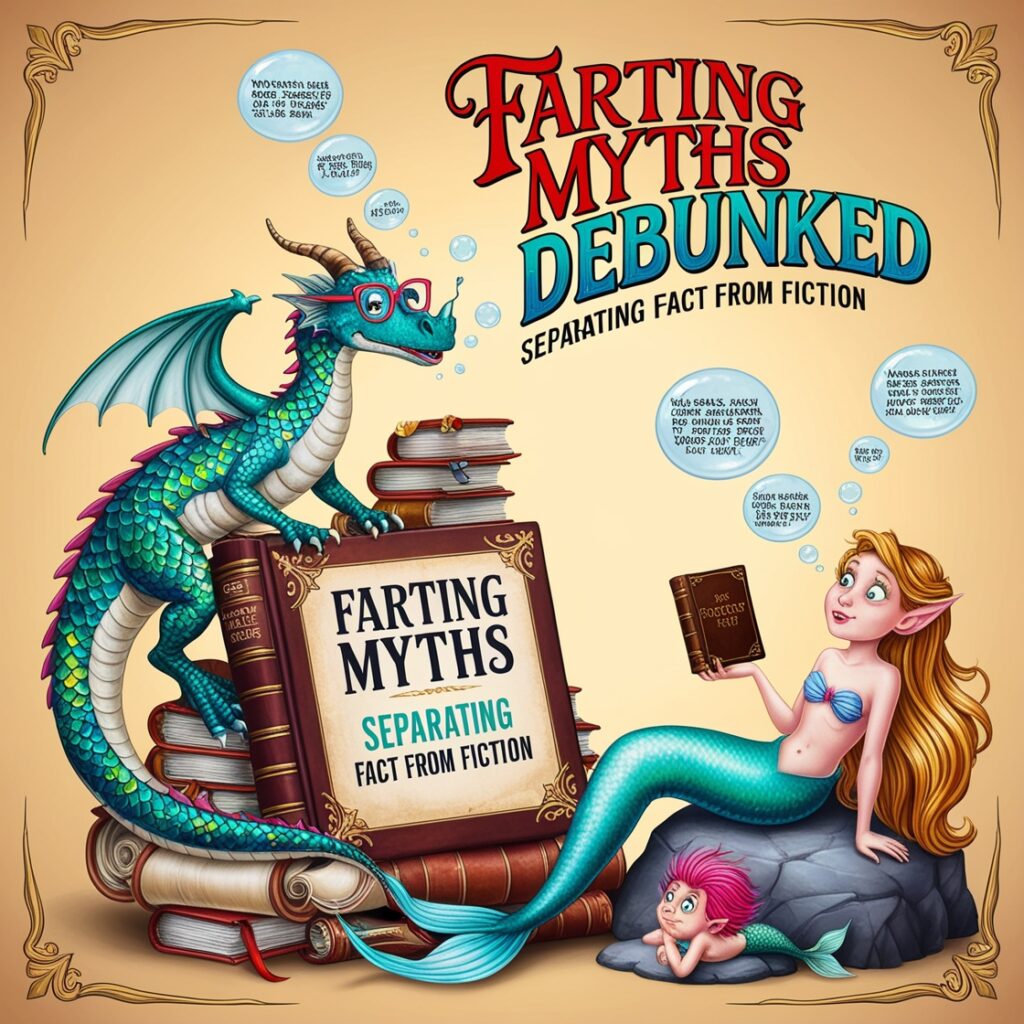Farting has been the subject of humor, embarrassment, and even urban legends for centuries. While we’ve all experienced flatulence firsthand, there are still plenty of misconceptions and myths floating around about why we fart, what causes it, and how to deal with it. Some of these farting myths are just plain funny, while others might leave you scratching your head.
In this post, we’ll debunk some of the most common farting myths, separating fact from fiction once and for all. Whether you’re a casual farter or a flatulence connoisseur, it’s time to set the record straight!
Myth #1: Holding in a Fart Can Be Dangerous
Fiction: There’s a common myth that if you hold in your farts for too long, you’ll either explode or the gas will travel back up your digestive system and come out of your mouth as a burp.
Fact: While holding in a fart can cause discomfort, it won’t make you explode. The gas will eventually be absorbed into your bloodstream and released through your breath, or it will escape when you finally relax. However, holding in gas too often can lead to bloating, abdominal pain, or even heartburn.
Bottom Line: It’s not dangerous to hold in a fart, but it’s not exactly comfortable either. Letting it out, when appropriate, is usually the best choice!
Myth #2: Only Unhealthy Foods Cause Gas
Fiction: Many people believe that only junk food or greasy meals cause gas, while healthy foods keep you fart-free.
Fact: Healthy foods, especially those high in fiber, can cause just as much gas (if not more) as unhealthy foods. In fact, beans, broccoli, and whole grains are some of the most notorious gas producers because they’re rich in fiber that’s difficult for your body to break down. Gut bacteria ferment this fiber, producing gas as a byproduct.
Bottom Line: Even the healthiest eaters will experience gas. It’s a normal part of digestion, especially when you’re consuming lots of fiber.
Myth #3: Farts Are Always Smelly
Fiction: Some people think that every fart smells bad and that if you don’t notice a smell, it wasn’t really a fart.
Fact: Not all farts are smelly! The odor of a fart depends on the gases produced during digestion. Farts that contain hydrogen sulfide (produced when your gut breaks down sulfur-containing foods like eggs and meat) are the stinkiest. However, some farts are primarily made up of odorless gases like nitrogen and oxygen, especially if they’re caused by swallowed air.
Bottom Line: Smellier farts are often linked to diet, but plenty of farts can be loud or silent without producing any noticeable odor.
Myth #4: Women Fart Less Than Men
Fiction: There’s a long-standing myth that men fart more than women or that women are less likely to fart at all.
Fact: Everyone farts! Both men and women produce the same amount of gas—about 15 to 20 farts per day on average. However, societal norms may lead women to be more discreet or self-conscious about their gas, which can give the false impression that they fart less.
Bottom Line: Gender doesn’t determine how much you fart. It’s all about your digestive system, what you eat, and how your body processes food.
Myth #5: You Can’t Fart While You Sleep
Fiction: Some people believe that the body “shuts down” farting while you’re asleep.
Fact: Your digestive system doesn’t stop working when you sleep, and yes, you can (and likely will) fart throughout the night. In fact, many people release gas while sleeping because they’re relaxed and the body is naturally passing gas accumulated during the day.
Bottom Line: Farting while you sleep is totally normal, and it’s likely happening without you even realizing it!
Myth #6: Eating Beans Always Causes Extreme Gas
Fiction: Beans have a reputation as the ultimate gas-producing food, leading many to believe that eating them will always result in an uncontrollable amount of gas.
Fact: Beans do contain oligosaccharides, a type of carbohydrate that’s difficult for the body to digest, which leads to gas. However, you can reduce the gas-causing effects of beans by soaking them before cooking, eating them in smaller portions, or pairing them with digestive aids like Beano.
Bottom Line: Beans don’t have to be a gas-filled nightmare. With a few adjustments, you can enjoy them without the side effects.
Myth #7: Farting Too Much Is a Sign of Poor Health
Fiction: Some people believe that excessive farting is always a sign that something is wrong with your health.
Fact: Most of the time, farting is a normal part of digestion and isn’t cause for concern. While it’s true that certain digestive conditions (like lactose intolerance, celiac disease, or IBS) can lead to more gas, farting on its own is rarely a sign of poor health. If you’re experiencing other symptoms like bloating, pain, or diarrhea along with increased gas, it’s worth speaking with a healthcare provider.
Bottom Line: Farting is normal! If you notice a sudden change in your farting patterns along with other digestive issues, that’s when it’s time to investigate further.
Myth #8: You Can Light a Fart on Fire
Fiction: Thanks to viral videos and urban legends, many people believe that farts can be ignited and set on fire.
Fact: Believe it or not, this one is actually true! Farts contain methane and hydrogen, both of which are flammable gases. In the right conditions (and with a lot of luck), it’s possible to ignite a fart. That being said, it’s not recommended—trying to light a fart can lead to burns or other accidents.
Bottom Line: Yes, it’s technically possible to light a fart on fire, but don’t try this at home!
Myth #9: You Can Fart Continuously Without Stopping
Fiction: Some people believe it’s possible to fart for an extended period of time without taking a break—like the longest fart in history.
Fact: While farts can feel long, they usually last just a few seconds. A fart is caused by a buildup of gas in your intestines, and once that gas is released, the fart is over. Continuous farting would require a constant supply of gas, which isn’t how your digestive system works.
Bottom Line: Farts come in bursts, and while they might be long and loud, there’s a limit to how much gas can be expelled at once.
Track Your Farting Habits with FartRanker’s Personal Fart Tracker
Curious about your own farting habits? You can track the frequency, volume, and smell of your farts with FartRanker’s Personal Fart Tracker. By logging your farts, you’ll get a clearer picture of what’s normal for your body, debunk any personal farting myths, and even spot patterns that help you improve your digestive health.
Here’s how it works:
- Log Your Farts: Keep track of every fart, including its smell and volume.
- Analyze Patterns: Use the data to see how different foods or habits affect your farting.
- Make Adjustments: Use your insights to improve your digestion and make smart choices about your diet.
Click here to start using the Personal Fart Tracker today and take control of your gas!
Conclusion:
Farting is a natural, healthy part of digestion, but there are plenty of myths surrounding it. From holding in farts to the truth about beans, we’ve debunked the most common misconceptions and set the record straight. Remember, farting is normal—so don’t be embarrassed. Track your farts, embrace the humor, and improve your digestive health with Fart Ranker’s Personal Fart Tracker!



As a health expert, I’m delighted to see such an important topic being addressed! Farting often gets a bad rap in societal discussions, but the truth is, it’s a natural and essential part of our digestive health. Let’s break down a few key myths that might be floating around, shall we?
**Myth #1: Farting is always a sign of a digestive issue.**
While excessive gas can sometimes indicate an intolerance or a bigger digestive problem, it’s perfectly normal for your body to produce gas. After all, various foods—including beans, lentils, and cruciferous vegetables—are known for their gaseous contributions. Remember, if someone’s cooking with beans, you’re not just getting a meal; you’re getting a potential wind symphony afterward!
**Myth #2: Only ‘gassy’ foods cause gas.**
While there are definitely foods that promote gas, it’s important to recognize that anything we consume can contribute to flatulence. Even mundane, non-gassy foods can result in gas production due to the fermentation process that occurs in our intestines. This means that even the most innocent-looking salad can lead to a few accidental ‘toots’ during your next Zoom meeting. So, brace yourself when making health-conscious choices!
**Myth #3: Women don’t fart as much as men.**
We need to clear the air on this one! While societal norms may suggest otherwise, studies show there’s no significant difference in frequency between genders. The only difference might be the volume of sound or aroma, but that’s part of the fun of being human, right? So next time you hear a delicate breeze in the room, remember that ladies can certainly wield some mighty gusts too!
**Myth #4: Holding in farts is totally fine.**
While it may seem polite to hold it in, doing so can lead to discomfort and bloating. Instead, try to find a discreet moment to let it out. Remember, much like keeping your secrets, holding in gas can create a pressure cooker situation—eventually, something’s got to give. And if you find yourself too quiet, just blame it on the dog!
**Pro Tip:** To promote a healthy digestive system and to keep the airwaves more pleasant, consider staying hydrated, getting enough fiber, and cultivating a balanced gut microbiome. Probiotics can also help reduce the types of gas that are more problematic, so don’t shy away from adding yogurt or fermented foods to your diet.
To sum up, everyone experiences gas—it’s a normal part of life and a sign that your body is functioning as it should. So, let’s celebrate our bodily functions rather than shy away from them! After all, in the grand symphony of life, every note counts, including those occasional cheeky toots!
Keep smiling and remember: it’s just gas; let it pass!